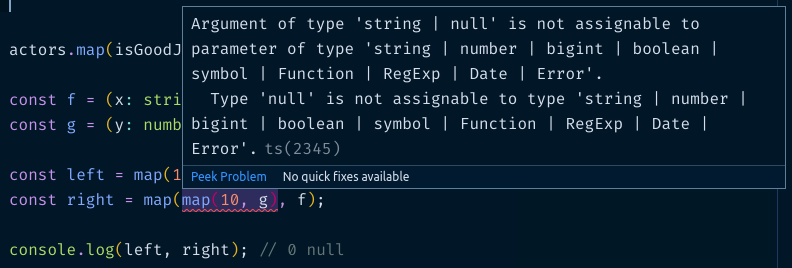Maybe‑ts. A softer approach to optionals
Dec 18, 2019 · WrocTypeScriptSlides: https://maybe-ts.now.sh/
The library: https://github.com/hasparus/maybe-ts
Talk duration: 15 minutes
I spoke about problems with hard Option type (like the one from fp-ts) mentioned in Rich Hickey’s “Maybe Not” and presented a foldable traversable monad instance which can used instead of Option to avoid the problems mentioned by Rich.
Edit: It breaks composition law :(
Thanks to @oliverjash and the FP Slack I learned and @gcanti released the version 0.2.1 of fp-ts-laws 😅.
A functor is a mapping between categories. gcanti’s post on dev.to excellently explains what a category is.
An endofunctor is a functor which maps a category into itself 🔄
An endofunctor in TypeScript is a type F<A> with a map function of type
<A, B>(fa: F<A>, f: (a: A) => B) => F<B>.
We’re pretty used to how map works for the most popular functor, the
Array. It would be cool if the definition of Functor was limited to the
types where map behaves similarly. It is. These are the laws:
1. functors preserve identity:
F.map(fa, a => a) = fa
2. functors preserve composition:
F.map(fa, a => bc(ab(a))) = F.map(F.map(fa, ab), bc)Our type is defined as
type Maybe<T> = T | null | undefined;Since Maybe<Maybe<T>> collapses to Maybe<T>, we do not preserve
composition. It is not a functor over nullables. Similar scenario takes
place for Promise and thenables.
Counterexample
const f = (x: string | null) => (x ? x.length : 0);
const g = (y: number) => (y === 10 ? null : String(y * 2));
const left = map(10, (x) => f(g(x)));
const right = map(map(10, g), f);
console.log(left, right); // 0 nullCan we save it?
But hey! I don’t really need Maybe<null | undefined>. It’s useless. What
if we could just get rid of these two empty values?
Let’s constrain the generic parameter. We’ll have to say goodbye to the fp-ts HKT, but let’s just try for educational purposes.
export type Nothing = null | undefined;
type NotNothing =
| string
| number
| boolean
| bigint
| symbol
| Function
| Date
| Error
| RegExp;
export type Maybe<T extends NotNothing> = T | Nothing;Let’s just paste extends NotNothing into every function that’s now glowing
red.

Our Maybe is not an endofunctor in TypeScript, but it is a mapping between
non-nullable TypeScript to TypeScript! Yeah! It is a functor then! Just
not an useful one.
Outline
- who am I
- wtf is Option
- problems with Option in fp-ts
- small problems
- fp-ts.Option.None is truthy
- incompatible with TS syntactic sugar optional chaining
(.?)and nullish coalescing(??)
- big problems (mentioned in Maybe Not)
- relaxing a requirement should be a compatible change
- strengthening a promise should be a compatible change
- small problems
- a simple solution
type Maybe<T> = T | null | undefined; - implementing a fp-ts typeclass instance to use instead of Option
- rad codesurferslides
- problems solved
- ✔ relaxing a requirement is a compatible change
- ✔ strengthening a promise is a compatible change
- ✔ it just works™ with optional chaining and nullish coalescing operators
- ✔ Nothing is properly empty value
(Nothing == null) === true
- when would you prefer Option?
- strictNullChecks: false
null(orundefined) is an important part of T
More links
- Optional in Swift — look how familiar it is